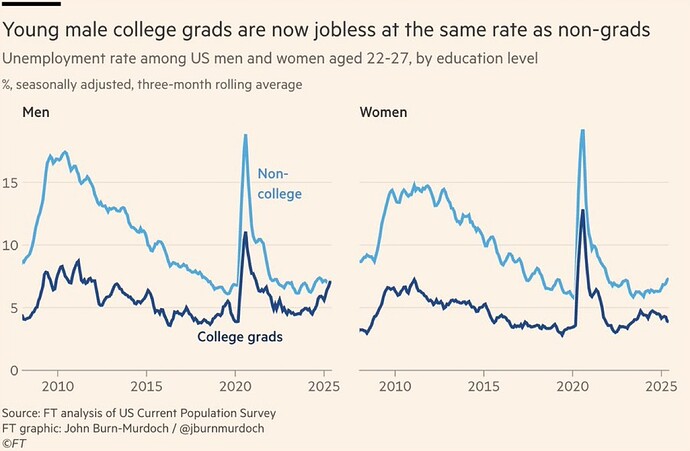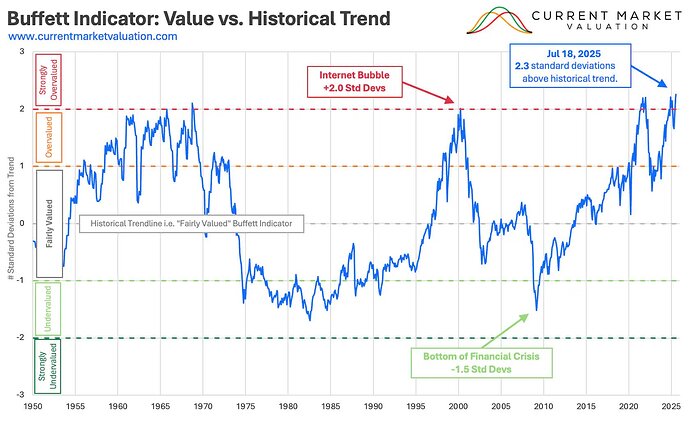I’m personally more productive at home because apart from not wasting time in the commute, a lot of the work day is spent chatting to colleagues and going to lunch, etc! Of course, that is important for team building etc and it’s not just quantity of output that matters, s long as the actual work does get done. I work hybrid and definitely get more work done in my 2 days at home than my 3 days in the office.
I hate this too. Younger S’s company just announced they’ll be laying off another 6% next month, after already cutting 10–15% earlier this year. I’m crossing my fingers that he’ll be OK. I really hate job searches for my kids! The “who you know” stuff is so real!
FDIL finally got a job at Older S’s company. She had been trying for over a year. Even with a referral from Older S, she didn’t get very far. He eventually flagged down the person she’d be working for and said, “I have a great person for you.” It’s so frustrating! (and adds to my worries if younger S has to search again)
As for working from home… I have one of each. Younger S went from being in the office three days a week to full-time. But he says he actually likes going in, especially since relocating offices and cities. His commute went from 90 minutes each way (with free rent!) to just 20 minutes. Plus, the new office has more people his age. He’s my social kid - and did not get this from me!
Older S… it’s funny. He was originally so excited to work for his company because of the cool building. Then he started in 2020 and worked from home for 18 months, and ended up liking that better. Now he grudgingly goes in 2–3 times per week, and only for part of the day. His point is, his team is scattered all over the world, so he’s doing Zoom meetings either way, from home or from the office. He still has some friends at work. I believe one is a groomsman.
And then there are some of us who aren’t allowed to work from home, even for a few hours if needed. When I had to work from home for three months (during the state shutdown), I got more done in those three months than I have in the last two years. Can I please work from home? Nope. The efficiency at my workplace has dropped so much over the past 30 years. The previous generation would be appalled. Apathy is contagious.
Regarding commuting, it is relatively easy when more other people (not necessarily at the same employer) are working from home. But it gets worse when fewer other people go to the workplace.
So going to the office when others are working from home and working from home when others are going to the office reduces the time spent commuting.
Yep, my commute time has increased noticeably as more people go back to the office permanently. I now leave half an hour earlier than I did initially to try keep my commute reasonable. (Which is relative, of course)
Interesting piece in the FT today, discussing how joblessness for new grads is concentrated amongst men, partly due to women taking a lot of jobs in healthcare.
The Twitter/X thread:
Does anyone have a gift link to the article itself?
WSJ gift link “The Cities Where College Grads Are Actually Landing Jobs.” (Top 5: Raleigh, Milwaukee, Baltimore, Austin, Birmingham)
https://www.wsj.com/lifestyle/careers/us-cities-entry-level-job-market-ab688897?st=uNUDPJ&reflink=desktopwebshare_permalink
An interesting, and sobering, article that puts some numbers around the issues facing new graduates. AI Is Wrecking an Already Fragile Job Market for College Graduates - WSJ
Thanks for posting. Sobering is the proper word. Whether this is right or not (and I have some experience, that there is validity to it) - I found this sentence insightful (the last sentence):
Her goal now is to find a client-facing job. “If you’re in a business back-end role, you’re more of a liability of getting laid off, or your job being automated,” she said. “If you’re client facing, that’s something people can’t really replicate” with AI.
I’d agree with that for the most part. Who knows how AI will grow and develop, but in the shorter term I think client facing roles will be harder to replace.
I was thinking not so much “client facing” the other day, but hands on. Could be anything from doctors and vets and nurses and physios to plumbers and electricians to massage therapists and manicurists.
There was a good report recently by GS but I don’t think there’s a public version (I googled and could only find links to an old one). They think that overall jobs growth won’t be terribly affected in the end as new work opportunities will be created by AI-linked innovation; but (as we said before above somewhere), an adjustment period of frictional unemployment will happen. Jobs already at risk include marketing consulting, call centers, graphic design and software development; youth tech worker unemployment is up around 3% since start of year, supporting anecdotes that new tech grads are finding it harder than before.
Problem is, such changes in the labor market result in obvious harms to some (loss of job/income → fall into poverty) while producing gains for others that may not be so obvious, or were not “necessary” for them.
Also, the increasing complexity of jobs, including new types of jobs being created, means that retraining for new jobs may be a high hill to climb for those who lost their obsolete jobs. If it takes years and significant tuition to retrain for a new job, that may not be accessible to a job loser who is running out of money.
Agree for sure - what economists refer to blandly as “frictional unemployment” generally means a lot of pain and stress for those caught in it
I found this article in the comments section of the WSJ article and my personal experience aligns with it.
My Two Cents which is what it’s worth.
To put it succinctly, there are three keys to success after college.
- Choice in the area of study. See the chart in the attached article for areas of study and the decrease or increase in demand for those graduates.
- What one does out side the classroom (ie Internships, Co-ops, Athletic and Academic clubs, leadership roles, etc. etc.) is more important than what they do inside the classroom. Point being, your cohort will graduate with a similar degree so what you did outside the classroom will separate you from the Pack.
- Proficient Soft skills. Let’s face it, if AI is going to take away all the tasks conducted by humans in a stand alone setting then Companies will hone in even more than ever on people who can work in a team, lead on a project and get along with everyone. Put another way, how many times have you heard a certain person was or was not a good fit.
My anecdotal evidence with AI is that it will take longer to fully implement and to be really impactful, thus Job destruction will be slower than what’s being hyped. The AI hype is great for priming the investor pumps of these AI companies as the need a lot of money to execute on their mission. Eventually, they will be successful and many areas of study will no longer be of a much value. However, I think it’s not two years but probably 10 years before we see significant impacts.
Arguably the biggest risk in the next few years is that the AI hype is a massive bubble that will pop and destroy a lot of capital, causing significant job losses in tech and related industries. This FT article points out the similarities to the telecoms bubble of the early 2000s and the contradictions inherent in current hype, namely that there just isn’t enough power available for the predicted number of GPUs:
And there are plenty of other articles out there about how stock market valuations look very bubbly right now.
In other words, there’s a lot of money to be made in trading energy futures. That’s one possible career path.
Back in the late 1990s that’s what Enron told us too…
This was the only career path that worked out well for Enron execs:
In fact, SIG and Jane Street have made energy trading an area of renewed focus. There is also other new initiatives focused on trading GPUs as an asset class
I don’t know how it impacts workers but MSFT stock is exploding and here’s some quotes but seems like AI is kind of here…but picking up steam.
“Cloud and AI is the driving force of business transformation across every industry and sector,” Microsoft CEO Satya Nadella said in a statement.
Despite Microsoft’s solid growth, Wedbush analyst Dan Ives wrote in a recent investor note that the company’s AI investments will truly take off in fiscal 2026.
“While AI use cases are building markedly in FY25, [it’s] clear FY26 for Microsoft remains the true inflection year of AI growth as CIO lines build for deployments behind the velvet ropes in Redmond,” Ives wrote.
Meta is also up - but says it will speed up AI investments:
Meta said it expects costs to increase as it spends billions on infrastructure and luring highly compensated employees as it works on its artificial intelligence ambitions.
Stock prices “exploding” doesn’t necessarily mean something is going to happen, much less imminently … remember the dotcom bubble? It took nasdaq 16 years to get back to the pre-bubble level.
Yes - but if you read the quotes, I’m just noting their investments in AI and other things - so they’re coming to businesses…or businesses are going to use AI more and more. Is that at the expense of people - I don’t know.
Of course, in the auto business, we’ve invested in EVs - and look where that’s gotten us…many running away from EVs.






